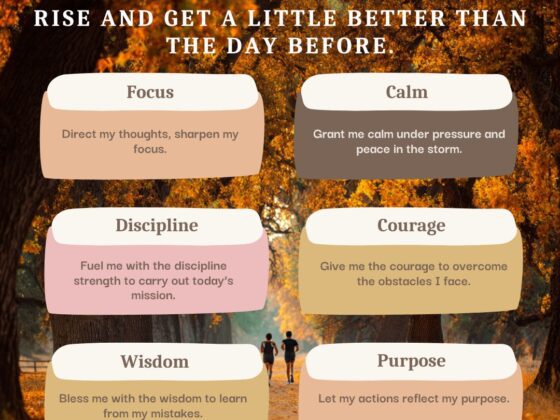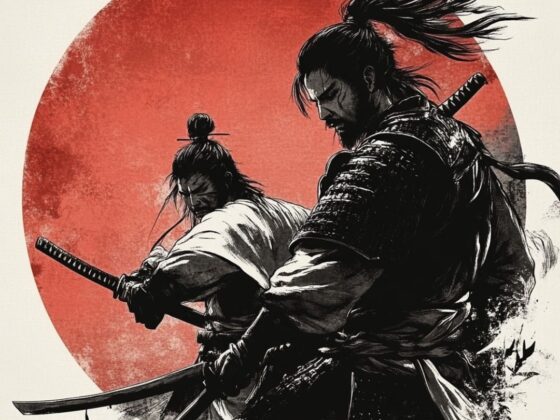If you are reading this post, you are probably on a similar journey as I am.
Like many of us, I am on a constant quest for self-improvement, striving to improve by 1 percent each day.
This could be improving your health physically or mentally. It could be trying to become a better father. You might be trying to become stronger financially or building your skills stack.
We often look outward to benchmark our current state and determine what areas we need to improve. This outward look is often towards someone already successful in the area we are trying to improve. This could include a famous author, podcaster, businessman/woman, athlete, movie star, or religious leader. The list is endless.
I firmly believe that learning from others is extremely important. Many people do not know what good looks like until they see it.
I am as guilty as everyone else, but what happens when we rely too heavily on successful people? Can we rely too much on successful people and prevent ourselves from achieving our goals? Can this overreliance prevent us from ever even starting to become a better version of ourselves?
While it is beneficial to seek inspiration and learn from others, overdependence can have some negative impacts, which I call MentorStuck.
What is MentorStuck?
MentorStuck reflects the excessive reliance on external figures for inspiration, often at the expense of one’s initiative and growth. When individuals become overly fixated on their idols, they may inadvertently hinder their creativity, progress, and success. Breaking free from this dependence involves recognizing the need to balance admiration with self-driven action.
MentorStuck could also be defined as a state or condition in which an individual becomes excessively reliant on or obsessed with their mentors, idols, or social media personalities to the point where it hampers their ability to think independently, be creative, accomplish personal goals, improve, or achieve success. This dependence creates a mental block, preventing individuals from developing their ideas and paths, effectively keeping them “stuck” in a cycle of admiration and emulation without personal progress.
MentorStuck would also describe a situation in which a person perceives such a gap in achievement between them and their mentor that they become paralyzed into a state of inaction and self-doubt.
What other impacts can being MentorStuck cause?
Comparison Trap
One of the biggest negative effects of being overdependent on successful people is getting stuck in a comparison trap.
“Lots of people wanting everything and doing nothing.” – Andy Frisella
Constantly comparing yourself to other people can lead to low self-esteem. It is easy to focus on the current success level of the people we follow. We completely ignore the journey, the failures, and the endless work required to create that success. Andy Frisella often talks about the many years of hardship and failure he faced before becoming successful. He makes an effort to overemphasize the challenges he faced before becoming successful.
Suppose you remain focused only on the success of the person you are following for inspiration and ignore the journey required to become successful. In that case, you can diminish your motivation and lose confidence in your ability to pursue your goals.
We also tend to forget that each person’s journey is unique. Successful people often have different resources, circumstances, relationships, and opportunities available, making it easier for them to continue being successful. Success begets success.
If you are unaware of this, you can set unrealistic expectations for yourself.]
Loss of Authenticity
Being overly dependent on successful people can also create a loss of authenticity.
We can often become too focused on someone else’s career path. We try to emulate their path too much and get stuck in a form of copycat syndrome. We can lose sight of our own goals, values, and innovation. This leads to pursuing goals that are not our own. This can lead to a loss of meaning and motivation in our daily lives, which can cause us to give up early in the process.
“Solitude is creativity’s best friend, and solitude is refreshment for our souls.”- Naomi Judd.
We are all unique individuals. Part of building a successful skill stack, career, or product is the innovation we create from our uniqueness. This innovation often comes from our unique approaches and perspectives. Over-reliance on the methods and successes of other people can stifle our creativity. Maybe it is more important to spend time in solitude, away from social media and other external influences, and develop original ideas.
Do not lose focus on your uniqueness.
Dependency on External Validation.
You are your own best critic. Sometimes, we look to too much external validation.
If you rely too much on the people who influence you on social media, you might prioritize their approval over your own. In many cases, there is such a gap in levels of success that this approval is only perceived in many cases. This, again, can lead to making decisions and setting goals that are not your own.
An example of this could be becoming too dependent on a mentor in one’s work environment.
What if someone is starting a new career? Let’s call that person Kevin. Kevin admires his boss, who is a successful and well-respected Information Technology executive. He has his own industry podcast and is regularly contacted by the media for feedback on technology trends. Kevin aspires to become like his boss.
By becoming overdependent on external validation from his boss, Kevin can feel anxious and uncertain about his work unless his boss validates it. He constantly asks his boss to approve his ideas, projects, and strategies. Kevin becomes completely dependent on positive feedback to have confidence in his decisions.
Even fear can enter the equation. Kevin might avoid making decisions because he fears his boss will not approve or endorse them. This would limit Kevin’s ability to be creative or grow professionally. Kevin would avoid taking risks or approaches unless his boss first approved them.
This can all lead to stunted professional growth, missed opportunities for innovation, and an ability to make decisions or take risks.
Paralysis by Analysis
I am probably the most guilty of this. We lose sight of the fact that we must all start somewhere. Success is not a lottery ticket. It is a slow process of graduation, improvement, and learning over time.
We often try to absorb too much information from the mentors we have in our lives. We become overloaded with information. We forget they have built up their knowledge and expertise over many years. When we try to absorb it all at once, it feels overwhelming. This can lead to analysis paralysis as you spend too much time trying to absorb all the information you are collecting. You spend time analyzing and trying to understand versus trying to take action.
If you want to start writing a blog, sit down and start writing every day. Yes, a plan is essential. We must also have a sound system that helps us write and consistently produce content daily.
Unfortunately, when we see the success of someone we follow on social media, we get caught up in everything else they do: their slick website, the production quality of their content, the technology they use, and the number of followers they have.
The amount of learning and experience to accomplish those you aspire to be overnight can become overwhelming. This leads to frustration and can cause you to give up early.
You can also get conflicting information, leading to a state of inaction.
How about a real-life health and diet example?
What if you religiously followed David Goggins and Cassey Ho for your health, diet, and fitness goals?
David is known for his extreme dedication to fitness and mental toughness. His philosophy revolves around pushing ourselves beyond our limits through intense, prolonged, sometimes painful physical challenges. He often engages in marathons and ultra-endurance events and pushes a “no-excuses” mindset.
Cassey Ho, the creator of Blogilates, advocates for a more enjoyable and approachable fitness routine. With Cassey’s approach, you often hear the words engaging or fun. She promotes a balanced approach to fitness and exercise and focuses on constancy and enjoyment versus extreme intensity.
If you followed both Cassey and David, you might get confused about how to structure your fitness routines. There is a stark contrast between David’s extreme discipline and Cassey’s balanced, enjoyable approach. This can create a certain level of uncertainty about which approach will bring the best results.
Goggin’s demanding approach may discourage some individuals who feel they cannot meet such high standards. His intensity might scare away some people. On the other hand, Ho has a more relaxed philosophy that might be too lenient for those needing the discipline to gain rapid or extreme results.
People may lose sight of the best approach for them and get stuck analyzing the differences between the two approaches versus taking action and getting into shape.
Ultimately, the best approach best aligns with your preferences, goals, and the systems you are trying to implement.
Inhibiting Personal Growth
Being overly dependent on mentors or personalities you admire can also stunt personal discovery. We learn and grow the most from our experiences, mistakes, and successes. Looking too much to others to find directly and being told what to do can prevent you from doing more self-discovery on your own. This self-discovery is critical to your personal development.
If you look too much to others for guidance and to help you make decisions, you might not develop the critical thinking and problem-solving skills you need to succeed.
If you constantly look to others for answers, you may reduce your ability to overcome challenges independently.
How to Balance Inspiration from Mentors and Independence
Finding a balance between seeking inspiration from others and your independence is critical to focusing on your goals and becoming successful. Maintaining a level of personal independence is important to focusing on your own dreams and goals and finding your path to success.
Use inspiration from your mentors wisely. Draw inspiration from your mentors and use their stories as motivation only. Do not use these stories as your blueprint. We are all unique, and we must follow our own unique paths. We must grow through our own experiences, mistakes, and successes.
Adapt your mentor’s strategies and make them your own. One way to do this is to rewrite your mentor’s advice or guidance in your own words. Try to put things into a frame that makes sense for your goals. Try to add additional value to what you learn and rewrite it in a new contract that will better ensure your success. Add your unique perspective to your learned information and make it your own.
Focus on your unique journey. We are all unique. Concentrate on your milestones. Do not forget the importance of the journey. The journey helps build the critical experience you need to succeed and then maintain success.
Life is a journey, not a destination – Ralph Waldo Emerson.
Fight through your fear of making mistakes. It is from mistakes that we learn and build experience. Celebrate your achievements and learn from your setbacks. Do not constantly compare yourself to others.
Find your own unique path to success.
Set personal goals and systems that work for you. Do not adopt the goals of others. Define goals that are meaningful to you and put systems in place that will help you work towards success every day.
Make sure that your goals align with your values, interests, and long-term vision. If you are not clear on your vision and goals, put systems in place that will put you on a path of continuous improvement and self-discovery. Sometimes, the journey is important to build the experience, and from experience, we begin to understand our long-term vision.
I am still trying to figure out “who I want to be when I grow up.” Personally, I am doing my best every day to put myself on a continuous journey of learning and improvement.
Make sure you are dedicating time to learning new skills and knowledge. Regularly practice these new skills to reinforce learning and build experience. Maintain a daily journal. Document your thoughts, experiences, and progress. Embrace systems that focus on embracing change. It is only through continuous change that we can also continuously improve.
Learn to rely on yourself and your own experience. Learn to have confidence in your abilities. This is another opportunity to embrace making mistakes and not fear them. Through these mistakes, you learn and find the formula to success. Any path to success requires trusting your instincts and learning to make decisions based on your judgments and experiences.
In the early 1980s, Steve Jobs was working on developing a personal computer that would be user-friendly and accessible to normal people. At the time, most computers were extremely complex and required significant technical expertise to operate. The thought of a home computer was almost a laughable concept to most experts at the time.
While this is not an example of limiting your mentor’s influence on your decision-making, it is an example of believing in your judgment and experience. In this case, Jobs trusted his own judgment and experience and insisted on user-friendly features like high-resolution screens, a graphical interface with icons and a mouse, and a text-based interface. He emphasized the importance of the user experience along with the technical design.
At the time, most engineers and executives within Apple doubted the vision and the market potential of Job’s vision. Job’s persistence and trust in his vision led to the release of the Macintosh in 1984. This is a powerful example of trusting one’s judgment and experience. By staying true to his vision and ideas about innovation, Jobs created a product that was not only commercially successful but transformed how the technology was used in the industry.
You can also limit external influence by limiting the number of people you follow. You can be selective about the mentors you have. Choose only those mentors whose ideas resonate with you and share your vision, morals, and goals.
Follow only those people whose approach best aligns with your preferences, goals, and the systems you are trying to implement.
In the end, we are all on a journey. It is this journey that defines us and helps us build experience. It is difficult for us to make this journey on our own, and we often look to mentors or other outside sources to guide or motivate us.
Having mentors and other influential personalities can be a critical factor in us becoming successful. We can learn much from people who are accomplished or already on a successful journey.
We have to remember to maintain a balance between inspiration and individualism and not become MentorStuck.










